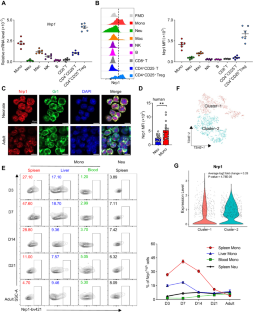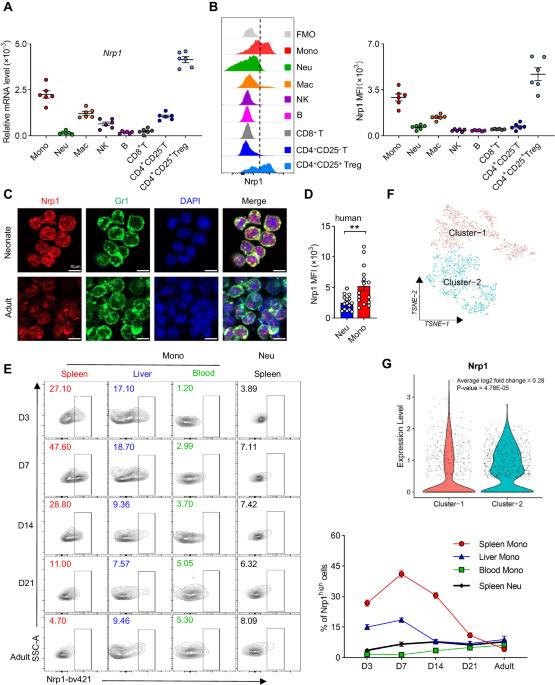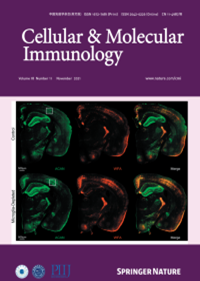Neuropilin-1high monocytes protect against neonatal inflammation
IF 21.8
1区 医学
Q1 IMMUNOLOGY
引用次数: 0
Abstract
Neonates are susceptible to inflammatory disorders such as necrotizing enterocolitis (NEC) due to their immature immune system. The timely appearance of regulatory immune cells in early life contributes to the control of inflammation in neonates, yet the underlying mechanisms of which remain poorly understood. In this study, we identified a subset of neonatal monocytes characterized by high levels of neuropilin-1 (Nrp1), termed Nrp1high monocytes. Compared with their Nrp1low counterparts, Nrp1high monocytes displayed potent immunosuppressive activity. Nrp1 deficiency in myeloid cells aggravated the severity of NEC, whereas adoptive transfer of Nrp1high monocytes led to remission of NEC. Mechanistic studies showed that Nrp1, by binding to its ligand Sema4a, induced intracellular p38-MAPK/mTOR signaling and activated the transcription factor KLF4. KLF4 transactivated Nos2 and enhanced the production of nitric oxide (NO), a key mediator of immunosuppression in monocytes. These findings reveal an important immunosuppressive axis in neonatal monocytes and provide a potential therapeutic strategy for treating inflammatory disorders in neonates.


神经纤蛋白-1 高的单核细胞可防止新生儿发炎
新生儿的免疫系统尚未发育成熟,很容易患上炎症性疾病,如坏死性小肠结肠炎(NEC)。早期调节性免疫细胞的及时出现有助于控制新生儿的炎症,但其潜在机制仍鲜为人知。在这项研究中,我们发现了一个新生儿单核细胞亚群,其特点是神经纤蛋白-1(Nrp1)含量高,被称为 Nrp1 高单核细胞。与 Nrp1 低的单核细胞相比,Nrp1 高的单核细胞显示出强大的免疫抑制活性。髓系细胞中缺乏 Nrp1 会加重 NEC 的严重程度,而 Nrp1 高单核细胞的收养性转移则会导致 NEC 的缓解。机理研究表明,Nrp1通过与其配体Sema4a结合,诱导细胞内p38-MAPK/mTOR信号传导,并激活转录因子KLF4。KLF4 可转录 Nos2 并促进一氧化氮(NO)的产生,一氧化氮是单核细胞免疫抑制的关键介质。这些发现揭示了新生儿单核细胞中重要的免疫抑制轴,为治疗新生儿炎症性疾病提供了潜在的治疗策略。
本文章由计算机程序翻译,如有差异,请以英文原文为准。
求助全文
约1分钟内获得全文
求助全文
来源期刊
CiteScore
31.20
自引率
1.20%
发文量
903
审稿时长
1 months
期刊介绍:
Cellular & Molecular Immunology, a monthly journal from the Chinese Society of Immunology and the University of Science and Technology of China, serves as a comprehensive platform covering both basic immunology research and clinical applications. The journal publishes a variety of article types, including Articles, Review Articles, Mini Reviews, and Short Communications, focusing on diverse aspects of cellular and molecular immunology.

 求助内容:
求助内容: 应助结果提醒方式:
应助结果提醒方式:


